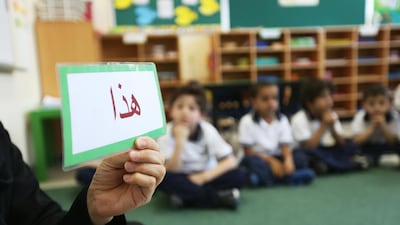My children have attended schools in Abu Dhabi for more than two years, and I am stunned by how little Arabic they have learnt, even though they attend Arabic language classes two or three times each week.
I have been studying Arabic since 1997, I use Arabic every day, and I have taught Arabic, so I’d be the first to admit that it is not an easy language to learn. I’ll never get to the point where I’ve “arrived” in Arabic fluency, and my children probably won’t either, but it is not too much to ask that my children come away from their Abu Dhabi experience with basic competence in spoken Arabic.
They are far from this right now, and I bring this up with their Arabic instructors every time parent-teacher conferences roll around. One of my daughters admitted to me recently that she has forgotten the Arabic letters she learnt when she first moved here, and my other daughter jokes about the useless vocabulary she learns in class.
I listen to schoolchildren sing the UAE national anthem, and it’s clear that most of the expatriate children have no idea what the words mean. This is a real shame, because learning Arabic is an enriching experience, a chance for foreigners to connect with local culture. Schools are missing a golden opportunity to bridge the gap between Emiratis and expatriates, and I have some suggestions for improving the Arabic curriculum for non-native students.
First, teach the children Arabic that they will actually use. My children interact with native Arabic speakers every day, usually on the school playground and in the classroom, but also in non-school settings. Chances are that if my children knew what to say in such circumstances, they would say it. If the curriculum they learn focuses on colours, numbers and writing letters, however, chances are that they will make no use whatsoever of the Arabic they learn in the classroom. Schools should teach children the kind of Arabic they will use in the playground, in the school hallways, at the shop and at the park.
Second, teach the children what the national anthem means. Arabic grammar is complex, but the anthem is simple enough so children can see how to put basic sentences together – a skill they could use in other settings. What’s more, if the children know what they’re singing, then they’ll be more likely to remember the words.
Third, teach the children using memorised dialogues. We use dialogues all the time, repeating the same words and phrases in predictable settings, such as playing, meeting new friends at the park and ordering bread at the bakery. Memorising dialogues is useful because it puts new vocabulary in context, which makes it much more likely that non-native learners will retain it. Native learners of any language actually memorise dialogues because they hear them replayed over and over, so it’s natural that non-native learners can use dialogues in a similar way. If children know what to say and when to say it, they will.
Finally, give the children homework. My children rarely come home with Arabic work to do, but if they had an assignment to go to the park and meet an Arabic-speaker, or to walk down the street and introduce themselves to an Arabic-speaking neighbour (perhaps with parental help), then they would be using Arabic outside the classroom. Children could also fill in the words left blank in a dialogue they’ve been memorising, or they could perform dialogues for their parents. Of course, these dialogues would have to be transliterated, not in Arabic script, but it would get the parents involved. The parents might even pick up a word or two.
Abu Dhabi schools should not miss out on the opportunity to build understanding of local language and culture. What better way to instil respect for local norms and values than to teach Arabic to expatriate children in a useful, simple way?
Nathan Toronto is an associate professor at the UAE National Defense College

